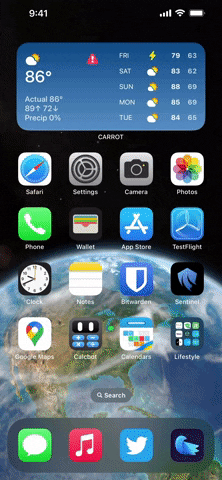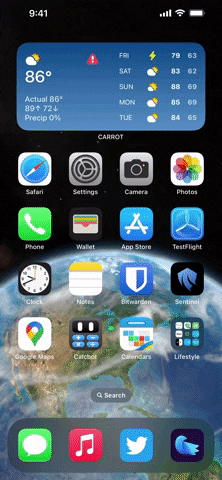For years, Android has provided easy ways to view all the Wi-Fi networks you connected to in the past, and you can even see the saved passwords in plain text. With iOS 16, Apple finally gave us a similar way to view saved Wi-Fi hotspots, copy their passwords, and remove old ones without being near their access points.
To manage the new Wi-Fi settings on your iPhone, you'll need to be running iOS 16. The change also appears in iPadOS 16.1 for iPad, which was just released on Oct. 24.
- Don't Miss: All 350+ New iOS 16 Features for Your iPhone
1. View Networks You Previously Connected To
In iOS 16, Apple lets you view all the Wi-Fi networks your iPhone has connected to and remembered. If iCloud Keychain is enabled on all your Apple devices, you'll even be able to see the Wi-Fi networks saved by those other devices. For example, you could use your iPhone to see all the networks your Mac or iPad saved.
Before iOS 16, you could use Keychain Access on your Mac to find some of the networks from your iPhone as long as Keychain was enabled for iCloud on all devices. Now, you can view all the past networks iOS saved directly on your iPhone.
To see all the saved networks, navigate to Settings –> Wi-Fi –> Edit. Then, authenticate yourself using Face ID, Touch ID, or your passcode to gain access. All of the remembered Wi-Fi hotspots will be under Known Networks.




2. Remove Networks You Previously Connected To
You can also remove any known Wi-Fi hotspot without being near or connected to it. For example, if you were on vacation and used the hotel's Wi-Fi, you could view and remove that network from your iPhone so that it won't try and auto-connect to it in the future. The passwords will likely be different anyway.
In iOS 15 and earlier, you can remove a Wi-Fi network from your iPhone by viewing the info (i) for it in your Wi-Fi settings and selecting "Forget This Network." You can still do this in iOS 16, but like in older software versions, you must be near the network to see it in your settings.
You could reset your network settings via Settings –> General –> Transfer or Reset –> Reset to remove all networks and start fresh, but that's overkill if you just want one network removed. Plus, it messes with other settings, such as your iPhone's name, manually trusted certificates, roaming, and any installed VPNs. You could also access and remove networks from your iCloud Keychain using your Mac, but you may not find every network.
That's why the new "Edit" menu for Wi-Fi settings is so great. When viewing the Wi-Fi editing options, tap the minus icon next to the network you want to remove, then tap "Delete" followed by "Done."






If you have iCloud Keychain enabled on all your iCloud-connected devices, you'll be asked to confirm the removal since it will forget the network on all devices. Tap "Remove" to confirm.

3. View and Copy Passwords for the Current Wi-Fi Network
Another great Wi-Fi feature in iOS 16 is the ability to view and copy the password of the Wi-Fi network you're currently on or any network in your known networks list. If you have iCloud Keychain enabled, you can also view and copy the passwords from any of your devices.
Before iOS 16, you could see and copy Wi-Fi Passwords with a Mac in Keychain Access, but the only thing you could do on your iPhone was instantly share your password for the current network with your friends and family near you without seeing it in plain text.
Go to Settings –> Wi-Fi, tap on the info (i) button next to the network your connected to, then hit the new "Password" field, which obfuscates the characters with dots. Your iPhone will authenticate you with Face ID, Touch ID, or your passcode, revealing the password in plain text. When the password reveals itself, a "Copy" option will also appear for you to copy the password to your clipboard.






4. View and Copy Passwords for Saved Wi-Fi Networks
The process is the same for saved networks as for the currently connected one, only you have to be in Wi-Fi's "Edit" menu to find all the known Wi-Fi networks. If you don't see the "Password" field for a hotspot, the network is probably unsecured, requiring no password to connect.




5. View Managed Networks from Your Carrier
You'll also see Managed Networks in the Wi-Fi settings editor. These networks were automatically added to your device via your cellular carrier or a configuration profile, and you cannot delete or forget them from the "Edit" settings.
For example, if you're on Verizon, you may see VerizonWiFiAccess and PrivateMobileWiFi. On AT&T, you may see attwifi and AT&T Wi-Fi Passport. These are hotspots carriers use to offload traffic from their cellular network.
Unlike with known networks, you can't delete/forget these or view any passwords.




Cover photo, screenshots, and GIFs by Daniel Hipskind/Gadget Hacks




Comments
No Comments Exist
Be the first, drop a comment!